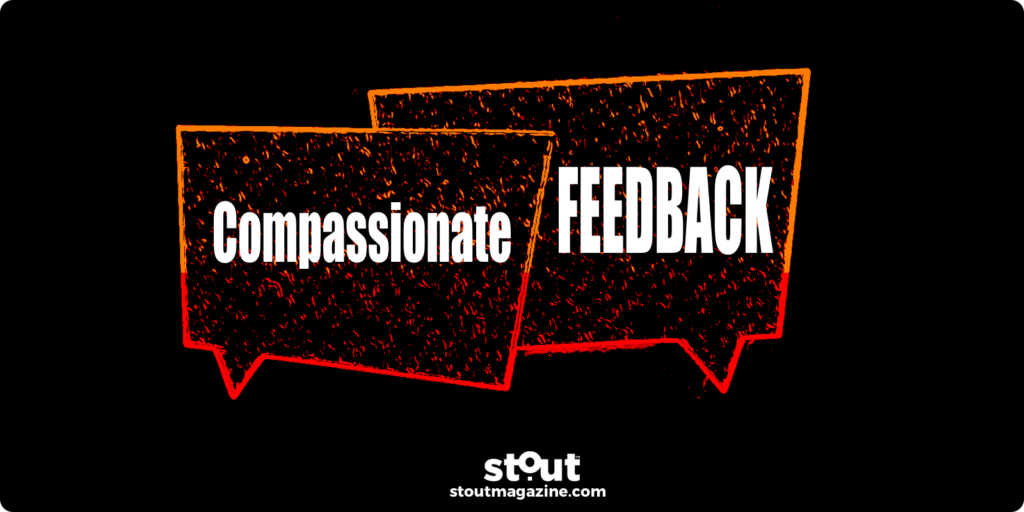
#FuelStop: Arianna Huffington On Compassionate Feedback

Two Minute Takeaways- Fuel Up & Go!
How Can You Create Feedback Flow Without Anyone Getting Huffy?
Stout Magazine was on deck for Thrive Global’s LinkedIn LIVE with Founder Arianna Huffington and Editorial Director Marina Khidekel to learn first hand how cultivating Compassionate Directness can help companies and individuals grow.

Arianna Huffington and Marina Khidekel on Thrive Global’s first LinkedIn Live, discussing insights on Compassionate Directness and giving and receiving feedback.
(1) Start With Trust
Huffington says creating a safe environment to discuss situations as they come up allows for more learning. Feedback should be considered information to be used for growth and innovation rather than criticism or a round of “the blame game”.
Creating a company-wide mindset that signals “we are all in this together” with the purpose of growth is crucial— ideas are much more likely to flow when people feel safe to openly express thoughts both positive and negative.
No innovation happens in risk-averse cultures
– Arianna Huffington
(2) Be “Compassionately Direct”
According to Huffington, Compassionate Directness is Thrive Global’s #1 company value. In fact, it’s their cornerstone to innovation.
So how can you be “compassionately direct”? The most important factor is to make feedback a conversation not a confrontation.
One way to do this is to offer a solution along with your feedback. This shows that your feedback is thoughtful and considered. It also signals that you are opening a door to work together towards a solution, fix or improvement rather than assigning blame or mounting a personal attack on someone’s work.
When feedback happens as a conversation within teams, in real-time, you create the ability to instantly course correct. “We don’t think it’s a problem to mention if something could have been better”, says Huffington, “Instead it’s seen as a great opportunity to use that feedback to create immediate improvement. We believe that learning to give and receive feedback directly but compassionately is the key to a thriving culture.”
To get to excellence, we need to acknowledge mistakes without taking it personally and view feedback as information, not a personal attack.
– Arianna Huffington
(3) Build Up Your Feedback Muscle
Huffington believe that good ideas will die on the vine unless everyone on the team learns to develop this skill. Her advice for building a strong feedback muscle is to do it bit-by-bit, holistically and with consistency.
Things will always come up that don’t work, that need improvement or overhaul, but as long as everyone can openly express feedback a person, team or company will have the ability to course correct and move forward. A culture of trust and the ability to give compassionately direct feedback is “the only way to grow, especially at a time when so much change happens,” says Huffington “without it you’ll end up with a ‘YES’ culture which doesn’t allow for fresh idea exchange or innovation.”
Small, daily, incremental steps can improve how we do anything: sleep, being grateful, or giving feedback in a compassionate and direct way.
– Arianna Huffington

Arianna Huffington’s Tips For How To Give Feedback
Make It A Conversation, Not A Confrontation
Be calm, conscious and centered to ensure your feedback is coming from the right place. If you’re stressed, tired, or upset step away – you’re likely to come across as adversarial.
Don’t Assume Problems Will Go Away By Themselves.
Honest, real-time feedback allows for instant course corrections. Issues tend to get more difficult to solve the longer you wait to address them.
Use Micro-steps To Build A Strong Feedback Muscle.
Work small, consistent doses of compassionate feedback into every interaction to build an “in this together” culture that fosters innovation and growth.
Want More?
Get to know yourself with more Stout insights on harnessing the power of looking within and building your emotional intelligence (EQ).
